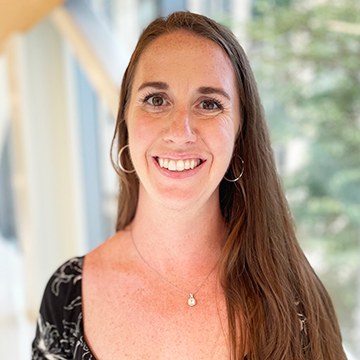Walsh-Bailey, McNerney, Aydemir Named K12 Scholars
One tablespoon of peanut butter, two broccoli crowns, eight ounces cooked pasta. Stir until combined.
“My parents would probably tell you that my desire to experiment came pretty early on; as a little kid I was constantly in the kitchen mixing various ingredients and coming up with new concoctions,” says Callie Walsh-Bailey, MPH, PhD, assistant professor of Medical Social Sciences in the Division of Implementation Science.
Today, that love for experimentation has led Walsh-Bailey to explore different ways of ensuring people get the services and resources they need to promote their health and wellbeing in a timely and equitable manner.

Rather than developing new interventions, I’m focused on helping healthcare and public health organizations and providers improve the delivery of interventions we already know work to improve health, with a particular focus on underserved populations.”
“Rather than developing new interventions, I’m focused on helping healthcare and public health organizations and providers improve the delivery of interventions we already know work to improve health, with a particular focus on marginalized and underserved populations,” says Walsh-Bailey, who was recently named a K12 scholar at the Northwestern University Clinical and Translational Sciences (NUCATS) Institute. “My primary interest is in preventing and reducing the negative impacts of chronic diseases, including cancer, diabetes, heart disease, and obesity, but I’ve also collaborated with teams working on other health topics.”
Walsh-Bailey joins Burcu Aydemir, PhD, research assistant professor of Medicine in the Division of Rheumatology, and Kevin McNerney, MD, assistant professor of Pediatrics in the Division of hematology, oncology, and stem cell transplantation, in the first cohort of K12 scholars at the NUCATS Institute. The Multidisciplinary Career Development Program (K12, formerly KL2) is a National Center for Advancing Translational Science-sponsored development award supporting early-career faculty at Northwestern. It is designed to train a diverse workforce of investigators to drive future innovation and implement effective clinical and translational research.
Being named a K12 Scholar is a tremendous honor and a pivotal moment in my career. This award provides me with invaluable resources and support that will significantly enhance my research capabilities and professional growth.”
Burcu Aydemir, PhD, K12 Scholar

“Being named a K12 Scholar is a tremendous honor and a pivotal moment in my career,” says Aydemir. “This award provides me with invaluable resources and support that will significantly enhance my research capabilities and professional growth. The K12 program offers a structured framework for growth, enabling me to focus more intensively on my research goals. I anticipate that this support will also help facilitate new collaborations.”
Aydemir is investigating rheumatoid arthritis (RA), a long-lasting disease that can severely affect a person's physical abilities. To reduce these effects, researchers must identify and address contributing factors that can be modified early on. This includes tackling issues with how pain is processed in the brain and managing psychological distress, which can worsen physical decline. The goal of her K12 project is to understand how problems with pain regulation and psychological symptoms affect physical function over time in people with early RA.
“The workshops and networking opportunities that exist as part of the K12 programming will be particularly valuable, allowing me to connect with fellow scholars and mentors while gaining new strategies for advancing my research and career,” says Aydemir.
McNerney is a pediatric blood and marrow transplant physician focused on the use of chimeric antigen receptor (CAR) T cells for pediatric malignancies.

I am honored to have been named a K12 scholar. To me, this represents Northwestern’s commitment to my research and to my development as a clinician-scientist, which is both motivating and humbling.”
“I have a strong interest in cancer immunotherapies, like CAR T cells, in pediatrics because of their efficacy in chemotherapy-resistant disease and also because of the potential to reduce long-term toxicities which is critical for young patients,” says McNerney. “I am particularly interested in making CAR T cells safer in patients with high disease burden, which is the focus of my K12 proposal.”
The trio recently took part in the NUCATS Institute’s K12 Bootcamp, a daylong orientation that featured 10-minute lightning talks from esteemed faculty with specialties ranging from data science and collaboration to community-engagement and implementation science.
“Although it felt at times like drinking from a firehose, I appreciated the opportunity to hear from many different speakers about the different support mechanisms available to us as K12 scholars” says Walsh-Bailey. “It was also really exciting and informative to see the directors’ vision for the revamped K12; the amount of thought and effort they’ve put into the planning really shows.”
The 2024 cohort joins six KL2 scholars in programming that includes robust mentoring teams to assess the educational needs of each individual while providing them with personalized career development opportunities.
“I am honored to have been named a K12 scholar,” says McNerney. “To me, this represents Northwestern’s commitment to my research and to my development as a clinician-scientist, which is both motivating and humbling.”
Research reported in this publication was supported, in part, by the National Institutes of Health's National Center for Advancing Translational Sciences, Grant Number K12TR005104. The content is solely the responsibility of the authors and does not necessarily represent the official views of the National Institutes of Health.
Written by Roger Anderson




